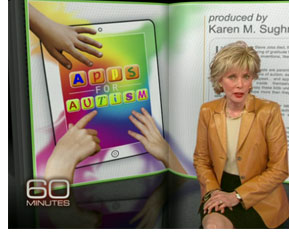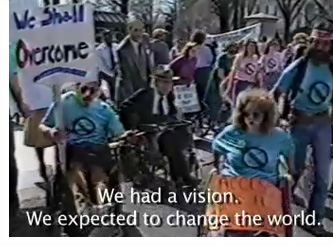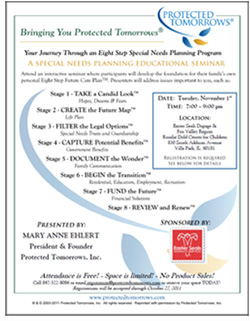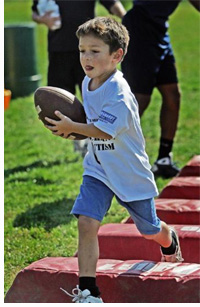A reaction to the Steve Jobs tribute on 60 Minutes
by Jennifer Friesen
 I’m pleased to introduce Laura Bierck, MA, CCC-SLP as our guest blogger today. Laura is our Lead Speech-Language Pathologist / Lead Therapist for the Outpatient Rehabilitation team here at Easter Seals North Texas.
I’m pleased to introduce Laura Bierck, MA, CCC-SLP as our guest blogger today. Laura is our Lead Speech-Language Pathologist / Lead Therapist for the Outpatient Rehabilitation team here at Easter Seals North Texas.
Good job, Steve Jobs
by Laura Bierck
I am the “iPad Person” here at work. Since I got my iPad last year for Christmas, I carry it with me each and every day, and if you ask me about it I’ll tell you about what an amazing therapy tool I think the iPad is.
I didn’t catch the 60 Minutes tribute to Steve Jobs when it originally aired, but when I heard that they did a section on the iPad and kids with Autism, I got on my Mac to find the story. The segment emphasized the large number of apps created for the iPad, and the number of apps created both to help children communicate and to teach other skills is beyond belief. But I want people to know that people with disabilities have been using computers with voice output for decades. The iPad did not give people with disabilities a new technology to communicate, but the iPad made this technology easy, more accessible, and really, more fun.
The iPad is something everyone wants to own, and for children with autism who already have difficulties fitting in, the iPad is something everyone is carrying around with them.
I have seen children with autism do amazing things with an iPad. I have a child that I worked with for months on identifying objects quickly learn this skill when the pictures were put on an iPad, because after he selected the right picture it bounced around the screen and cheered for him. I have had children learn the names of their friends, learn what to say next in a conversation, and even form friendships with the help of an iPad. And as showed on the 60 Minutes segment, I have seen kids who previously had no clear way to communicate use an iPad to express what they want. It makes my heart happy.
All that said, I have also seen children with autism who use an iPad only as another way to “stim,” who open and close applications quickly, not caring to look at any programs at all. The iPad is not a “cure” for Autism. However, for the right kids, and with the right people in their lives to help them navigate these programs, Apple devices and the thousands of apps developed for them have created a fun and motivating way to help kids learn and to help them communicate with the world. I’m sure that when Mr. Jobs created the iPad, he was not considering the special needs population. We have the amazing app developers, parents, teachers, and therapists to thank for coming up with creative ways to use what he developed to create a more exciting way to teach and communicate. I thank Mr. Jobs for creating a device that is able to mainstream the available technology in order to reach kids with autism. Technology can make them excited to learn and participate in the world around them.







 Partnerships. Collaboration. Cooperation. Friends. These powerful words represent the fantastic relationship we have with our Easter Seals corporate partner
Partnerships. Collaboration. Cooperation. Friends. These powerful words represent the fantastic relationship we have with our Easter Seals corporate partner  A first-of-its-kind television documentary will premiere on
A first-of-its-kind television documentary will premiere on 
 I am pleased to have Nicole Berlowski as a guest blogger today. Nicole is a senior therapist here at
I am pleased to have Nicole Berlowski as a guest blogger today. Nicole is a senior therapist here at